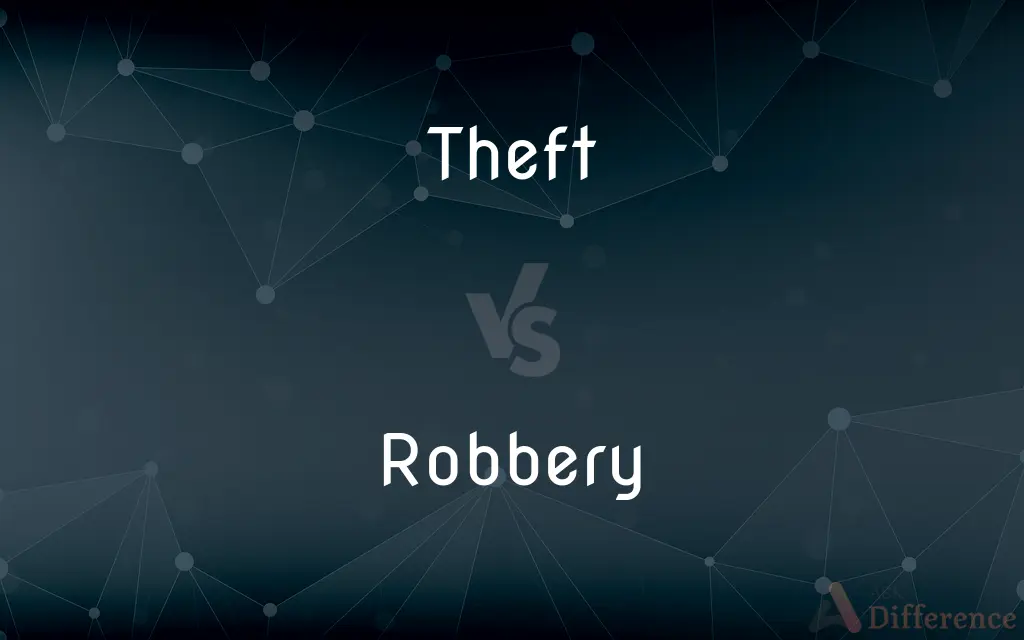Theft vs. Robbery — What's the Difference?
By Urooj Arif & Fiza Rafique — Updated on March 8, 2024
Theft involves unlawfully taking someone's property without force or threat, while robbery includes taking property through force or intimidation.

Difference Between Theft and Robbery
Table of Contents
ADVERTISEMENT
Key Differences
Theft, also known as larceny, is characterized by the unauthorized taking of another person's property with the intent to permanently deprive them of it, without the use of force or intimidation against the person. Robbery, on the other hand, involves not only the taking of property without the owner's consent but also the use of force or threat of force. This added element of intimidation or physical violence against the victim distinguishes robbery from theft.
The legal consequences of theft and robbery can vary significantly, largely due to the presence of force or threat in robbery cases. Robbery is generally considered a more serious crime than theft and is often classified as a violent crime, which can result in more severe penalties upon conviction.
The victim's experience differs greatly between the two crimes. In theft, the victim may not be present or aware of the crime until after the fact. In contrast, robbery directly involves the victim, often leading to immediate physical danger and psychological trauma due to the use of force or intimidation.
Prevention and response strategies for theft and robbery also differ. Theft prevention might focus on securing property and monitoring areas, while robbery prevention involves personal safety measures and strategies to reduce confrontational situations.
Comparison Chart
Definition
Unlawfully taking someone's property without force
Taking property through force or intimidation
ADVERTISEMENT
Key Element
Absence of force or intimidation
Use of force or threat against a person
Legal Consequences
Generally less severe than robbery
More severe, classified as a violent crime
Victim's Experience
May not be aware at the time; less immediate danger
Direct involvement; potential physical harm
Prevention
Securing property, monitoring
Personal safety measures, reducing confrontational risk
Compare with Definitions
Theft
Does not involve direct confrontation or violence.
A pickpocket steals wallets without the victims noticing.
Robbery
Combines theft with the use or threat of force.
A mugging at gunpoint where the victim's watch is taken is robbery.
Theft
Can be committed in the absence of the property owner.
Shoplifting occurs when items are secretly taken from a store.
Robbery
Involves direct interaction with the victim.
Bank robbers intimidate tellers and customers during a heist.
Theft
Intent to permanently deprive the owner of the property.
Taking jewelry with no intention of returning it is theft.
Robbery
Can result in physical harm or psychological trauma.
Victims of robbery may suffer injuries or long-term fear.
Theft
Involves taking someone's property without permission.
Stealing a bicycle from a public rack constitutes theft.
Robbery
Considered a violent crime due to the use of force.
The law treats robbery as a serious offense with severe penalties.
Theft
Legal penalties depend on the value of the stolen property.
Theft of expensive items may result in felony charges.
Robbery
Prevention focuses on personal safety and awareness.
Avoiding risky areas and behaviors can reduce robbery risks.
Theft
Theft is the taking of another person's property or services without that person's permission or consent with the intent to deprive the rightful owner of it. The word theft is also used as an informal shorthand term for some crimes against property, such as burglary, embezzlement, larceny, looting, robbery, shoplifting, library theft or fraud.
Robbery
Robbery is the crime of taking or attempting to take anything of value by force, threat of force, or by putting the victim in fear. According to common law, robbery is defined as taking the property of another, with the intent to permanently deprive the person of that property, by means of force or fear; that is, it is a larceny or theft accomplished by an assault.
Theft
The action or crime of stealing
The latest theft happened at a garage
He was convicted of theft
Robbery
The act or an instance of unlawfully taking the property of another by the use of violence or intimidation.
Theft
The unlawful taking of the property of another; larceny
The prevention of theft.
Robbery
The act or practice of robbing.
Theft
An instance of such taking
Several car thefts.
Robbery
(legal) The offense of taking or attempting to take the property of another by force or threat of force.
Bank 'robbery
Theft
(Obsolete) Something stolen.
Robbery
The act or practice of robbing; theft.
Thieves for their robbery have authorityWhen judges steal themselves.
Theft
The act of stealing property.
Bike theft is on the rise
A suspect was arrested for the theft of a gold necklace.
Robbery
Larceny by threat of violence
Theft
The act of stealing; specifically, the felonious taking and removing of personal property, with an intent to deprive the rightful owner of the same; larceny.
Robbery
Plundering during riots or in wartime
Theft
The thing stolen.
If the theft be certainly found in his hand alive, . . . he shall restore double.
Theft
The act of taking something from someone unlawfully;
The thieving is awful at Kennedy International
Common Curiosities
Are there different types of theft?
Yes, there are various forms of theft, including petit larceny (involving items of lesser value) and grand larceny (involving more valuable items).
What is armed robbery?
Armed robbery involves using a weapon to commit robbery, significantly increasing the crime's severity and penalties.
Can robbery charges be applied if no one is physically hurt?
Yes, robbery charges can apply if there is intimidation or the threat of harm, even if no physical injury occurs.
Is burglary the same as theft or robbery?
Burglary involves unlawful entry into a structure with the intent to commit a crime inside, usually theft but not necessarily involving direct force against a victim like robbery.
Can theft become robbery?
If a theft involves escalating to the use of force or intimidation against a person to complete the crime, it can be considered robbery.
What role does intent play in theft?
Intent is crucial; the person must intend to take property without permission and with no intention of returning it to be considered theft.
How do law enforcement agencies prevent robbery?
Agencies use strategies like increased patrols, community awareness programs, and surveillance technologies to deter and respond to robbery incidents.
Is shoplifting considered theft or robbery?
Shoplifting is considered theft, as it involves taking items without permission but typically without direct force or intimidation against a person.
What should a victim of robbery do?
Victims should prioritize their safety, try to observe any identifying details of the perpetrator, and report the incident to the police as soon as possible.
Can someone be charged with robbery if the victim is not present?
Generally, robbery involves a victim's presence; if the victim is not present, the crime might be classified differently, depending on the circumstances and jurisdiction.
Share Your Discovery

Previous Comparison
Panthenol vs. Alcohol
Next Comparison
Locus vs. FocusAuthor Spotlight
Written by
Urooj ArifUrooj is a skilled content writer at Ask Difference, known for her exceptional ability to simplify complex topics into engaging and informative content. With a passion for research and a flair for clear, concise writing, she consistently delivers articles that resonate with our diverse audience.
Co-written by
Fiza RafiqueFiza Rafique is a skilled content writer at AskDifference.com, where she meticulously refines and enhances written pieces. Drawing from her vast editorial expertise, Fiza ensures clarity, accuracy, and precision in every article. Passionate about language, she continually seeks to elevate the quality of content for readers worldwide.
















































